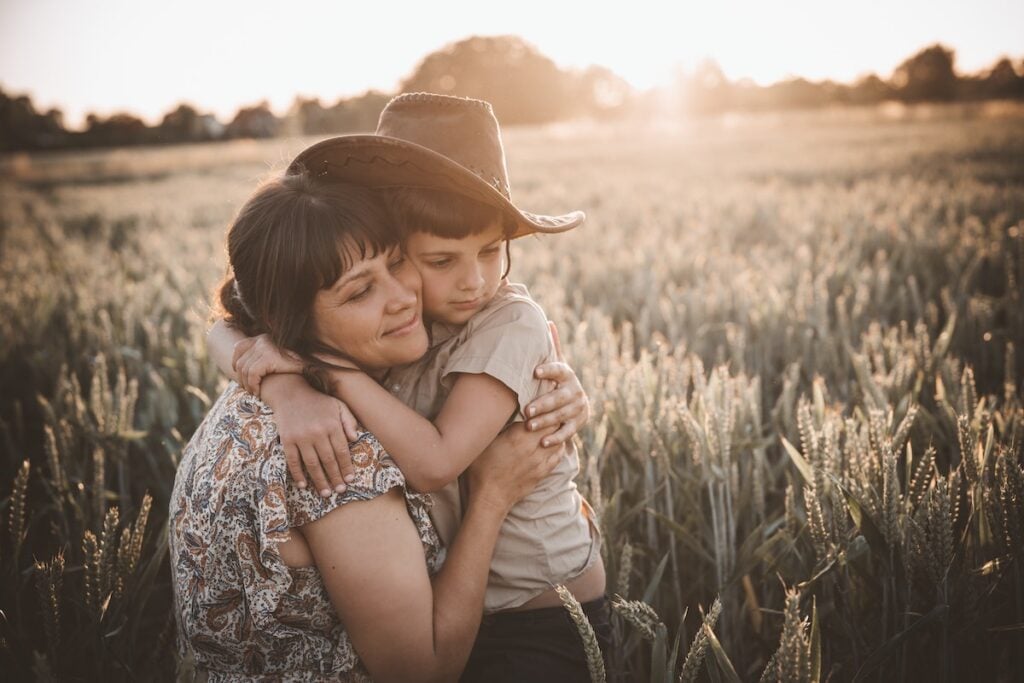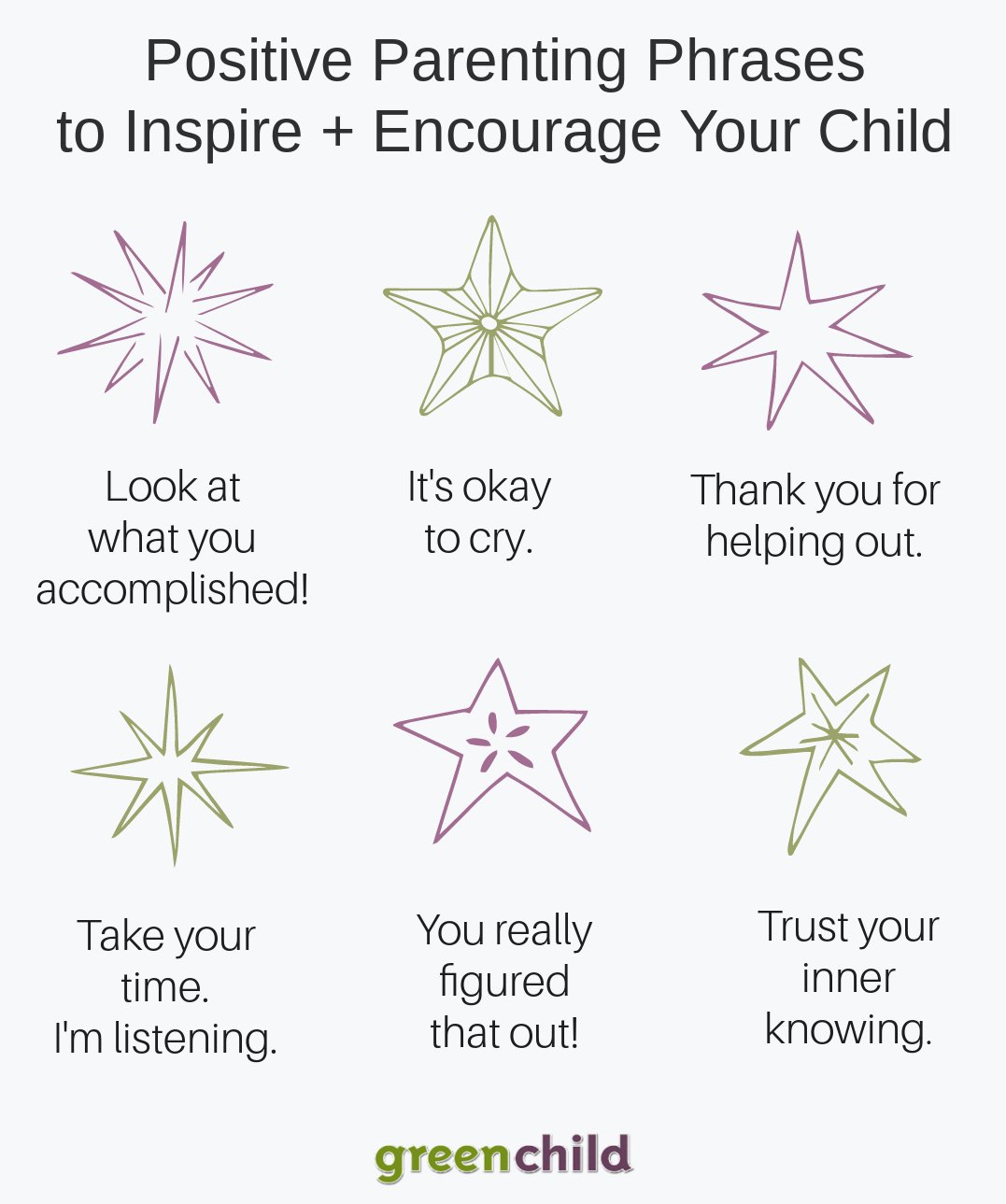Positive Parenting: 5 Encouraging Phrases for Kids
It’s no secret that kids need encouragement to thrive. But how exactly do you encourage your child authentically? And are the encouraging phrases you’re using for your kids really the best things to say?

It’s different from praise, admiration, or guidance.
It is common to want to give evaluative feedback to kids for their work. We may think that positive things to say to kids include things like, “Good coloring!”. Or an explanation of what we like about their accomplishments (“I like how you set the table.”) is encouraging. Or that what we expect of their behavior. (“You need to try your best at school today.”) will encourage them to do their best.
Though these kinds of responses may seem like encouraging phrases for kids, they actually teach them to rely on our evaluations rather than to learn to form their own judgments about behavior.
How Praise and Encouragement Differ
Alfie Kohn, researcher and author of Punished by Rewards, says that kids can come to depend on praise and external validation instead of finding satisfaction in doing the right thing simply because it’s the right thing to do.
“Rather than bolstering a child’s self-esteem, praise may increase kids’ dependence on us. It leads them to measure their worth in terms of what will lead us to smile and dole out some more approval,” says Kohn. He recommends that as a parent, you focus on supporting and encouraging your child’s efforts, rather than on praising the results.
Encouragement is about teaching kids to see the value of their own accomplishments and to be in charge of their own success. It fosters internal strength and motivation by keeping the focus of children’s behavior on themselves instead of anyone else.
As psychologist Rudolf Dreikurs said, “A child needs encouragement like a plant needs water.”
Positive & Encouraging Words for Kids
If you want your child to put less emphasis on the opinions and evaluations of others, try offering positive words that center on them, not you. Here are some encouraging phrases for kids you can use to get put them a little more in control – but also remind them that your love is unconditional.
“Thank you!”
For tasks that a child has completed, let him know his efforts are appreciated. Tell him, “That helped a lot,” and, “I appreciate the time you spent on this.”
It lets him know that his work is meaningful and he is an important contributor to the family. Saying ‘thank you’ is no less celebratory than saying ‘good job.’ Expressing gratitude for a job well done still communicates excitement and pride. The difference is you don’t need to tell your child that what he did was good; he will inherently feel it.
Claire, a stay-at-home mom of three boys, said that at dinner one night, she thanked her 3-year-old, Tucker, for giving each family member a napkin to use. When Tucker climbed into his chair and replied, “Mama, I like you thanking me. That feels nice,” she was struck by the power of those simple words. Without any praise, Tucker felt significant and appreciated; he felt his “good job,” and he was motivated to do it again.
“You did it!”
Use this kind of encouragement for when a child has achieved a goal or milestone. Cheer for her by focusing on the effort it took to get there, rather than on the outcome. Instead of saying, “I like how you built that Lego tower,” respond with, “Wow you worked hard on that!”, “Look at what you accomplished!”, or, “You must feel proud.”
Responses like these focus the accomplishment on the child’s inner work, rather than on a parent’s external evaluation. It’s much more encouraging to say, “You sure never gave up during your game!” than to say, “You won your game, good job.”
“I’m listening.”
What could be more encouraging than to know someone is receptive to what you have to say? Active listening validates a child’s sense of significance and belonging in the family; they know they’re important and they matter.
Let kids know you’re taking their thoughts seriously by echoing their statements back to them.
There should be some back-and-forth with
- Open-ended questions – “What would you do about that?”
- Empathy – “Wow, you must have felt scared.”
- Reflections – “Oh, you decided to take a break so you could calm down.”
Good listening sounds more like a conversation than a one-sided monologue. And when a child is heard, they feel seen and known.
“It’s okay to cry.”
It’s important for kids to know that their feelings are always OK. Learning how to manage these feelings takes support, acceptance, and lots of practice. Encourage your child by communicating that it’s not wrong to experience unpleasant feelings like sadness, anger, or fear.
Instead of saying, “You’re OK. Don’t be upset,” let your child know, “You have the right to feel angry. I understand; I would feel mad, too.” Or, “I can see you feel very sad right now, and that’s OK.” Validating your child’s feelings leads to their own acceptance of them, and the realization that they are capable of handling them.
“I trust you.”
Instead of providing the answers and directing kids toward what to do, encourage your child to make decisions and solve problems by letting them know you trust their ability to decide for themselves. Say things like, “I know you can figure this out,” “I have faith in you to find a solution,” “I know you’ll make an appropriate decision,” or “You lead the way on this.”
Entrusting kids to make their own decisions is very empowering for young children! It shifts the dynamic from a parent’s control over a child to one of shared control. It encourages kids to think through problems and come up with their own solutions.
Remember that by opting for encouragement over praise, you’re not ignoring your child’s accomplishments or successes. Encouragement is simply about keeping your response focused on their efforts and feelings as opposed to only the outcomes. Encouraging words not only reassure kids during times of success (“Wow, that took a lot of concentration!”), but also in times of disappointment (“I have faith in you to fix this mistake.”).
Tailor These Phrases to Meet Your Family’s Vibe

Find the way to say these encouraging phrases for kids in a way that fits the relationship you have with your child. Make sure you feel authentic in the way you say them.
Instead of looking to a parent for affirmation, kids are able to decide how they feel about themselves. Their failures and successes – as they should be – are about them, not anyone else.
This article was originally published in February 2014 and updated in November 2022.


Great article very well written. I will share in my presentations when I discuss encouragement as one of the five gateways to your child’s cooperation!
re the crying: i think parents are too quick, sometimes, and end up encouraging unnecessary crying.
for example, my youngest: she was walking but i don’t think she was a year old (she walked at 9mo) when we were at a playground. she was walking, almost running, along the path toward the climber and she tripped at the top of a short flight of shallow flagstone steps and ended up body-surfing down them to land face-down in the sand.
three women sitting on benches nearby instinctively lunged forward but i froze still and waited. she lay there for a few moments, then turned and looked at me. i kept my face calmly smiling and said “you okay, there?” at which she flashed me a big, beaming grin, jumped up, and continued running toward the climbers.
she’ll be 7 on the 16th. she has asperger’s and even to this day, she falls down the stairs at least once a day. it’s just something that happens. she goes down, then pops right back up with “i’m okay!”
if she actually cries from falling down, it’s a 50-50 shot we’ll have to take her to emerg.
on the other hand, i know kids – friends, relatives – that bawl and sob at the drop of a hat. they cry so much and for such trivial things that nobody even listens or takes them seriously when they cry any more.
This is wonderful and I am pleased to realize I use lots of these phrases regularly.
I do understand the importance of ‘It is OK to cry’ however I have almost 4 years old who is screaming quite often. I also have a 7 months old baby who gets scared by my older one and starts crying as well. Two examples:
My son lost something and cannot find it. He starts screaming really loudly – people on the street and in the house next to us can hear. I tell him it is ok to be sad because he cannot find it in the moment and offer him a help to look for it. Unfortunately this does not stop him from screaming and in next 5 minutes my baby is crying. This is normally the time I tell him to stop screaming. It does not help as well but do not know what else I can do.
The second case is crying during nights. I do not think he has a nightmare as he is awake. He cries and screams so loudly he wakes up everyone including our neighbors and of course my baby. I ask what he needs or wants or if something is hurting him but no answer just screaming. I take him to different rooms, try to offer different drinks but no answers. I can last for over 30 minutes.
How would you handle these situations?
Hi Jane
I have to admit, my 1st thought after reading your question was a memory of my own mother threatening us that if we didn’t stop crying, she would give us something to cry about. But that was over 50 years ago and not quite frowned upon where I come from, lol. Seriously though, from my own child rearing experience, I would suggest that you ignore the tantrum. Trust me I know, it’s easier said than done. Obviously, the daytime tantrums will be more convenient to ignore but it probably won’t take too long for your little one to catch on. Your attempts to appease him/her are preventing the child from learning to calm down on their own. If you continue to react every time there’s a tantrum, there will continue to be tantrums. If you ignore it, eventually they’ll learn that it doesn’t work to get what they want-YOU. It’s a learned behavior that has to be unlearned. Turn the baby cam on, put your earbuds in, get some for the younger child too, and do the hard part- wait it out. It won’t be easy but before you know it, life will get better. Good luck and hang in there!
Great question from Ivette and reply as this is something I struggle with, to acknowledge their feelings but not cave in to their feelings. It seems to be about acknowledging rather than accommodating their feelings, we don’t have to change the goal post. Like Joni Mitchell once said, “There is one thing I’ve been trying to bring across to people; You’re on your own, let’s face it (as in own and deal with your feelings). And that’s okay!”
I am a fan of Kohn as well, but struggled with some of the applications. You seem to have continued this conversation and made the teachings a little easier to apply in daily life, so thank you for that.
Your response about crying made me think of the children’s record album (Yes, that long ago!) “Free to Be You and Me” — and specifically the song sung by Roosevelt Greer on the album…”It’s alright to cry, crying gets the mad out of you…it’s alright to cry…it might make you feel better!” (and imagine what my mother-in-law thought about THAT parenting idea for her 2 grandsons!!)
This is great! My husband and I have a 3 year old and a baby and we unknowingly practice these phrases with our kids because that’s what we think works best. The only one I’m having trouble understanding is the “it’s OK to cry”. I can see how encouraging them to be comfortable with their feelings is very positive but when my kid is crying because he wants something that he can’t have, I don’t see how saying it’s okay to cry would help. We often tell him to stop crying and ask for things properly and we will evaluate whether it’s appropriate to have it or not but crying because we say no to something, seems wrong to encourage by saying it’s okay! How would you handle this situation?
Hi Ivette, that’s a good question! Crying is the most effective (and usually the only) way for a child to communicate sadness. So telling a child it’s not OK to cry is like saying it’s not OK to be sad. Children should know that all of their feelings are OK and normal. We may not always agree with their tears or understand them, but a child feels the way he feels and should be allowed to express it. It is a child’s regular expression of feelings and a parent’s regular acceptance of them that leads to the eventual self control and. When his feelings are acknowledged and heard and responded to with empathy and respect, he learns how to express and manage them appropriately.
For example, if you told your child “no”about something and he cried, you would hold your limit and let your child know you understand he is upset. “I know you’re mad. You really wanted that. It’s OK to be sad about that.” That’s it…you let him have his feelings about that, show him some empathy, but also not change the limit you’ve set. The encouragement here is not about encouraging your child to have a fit every time you say no; it’s about encouraging your child to acknowledge and accept his hard feelings and learn how to handle his disappointment. Soon, he will grow and mature and be disappointed when you say no, but will be able to self-regulate better.
What’s truly encouraging is for him to know that he is wholly accepted by you, hard feelings and all.